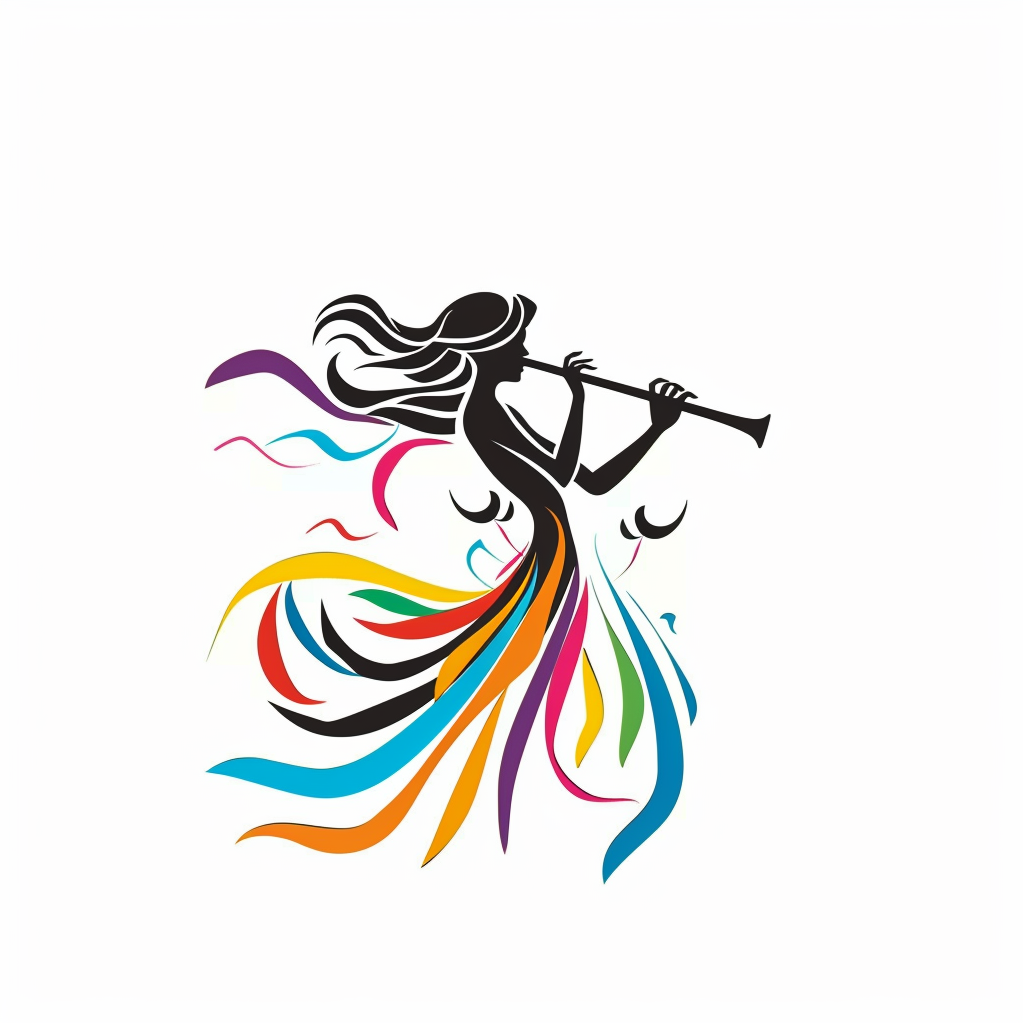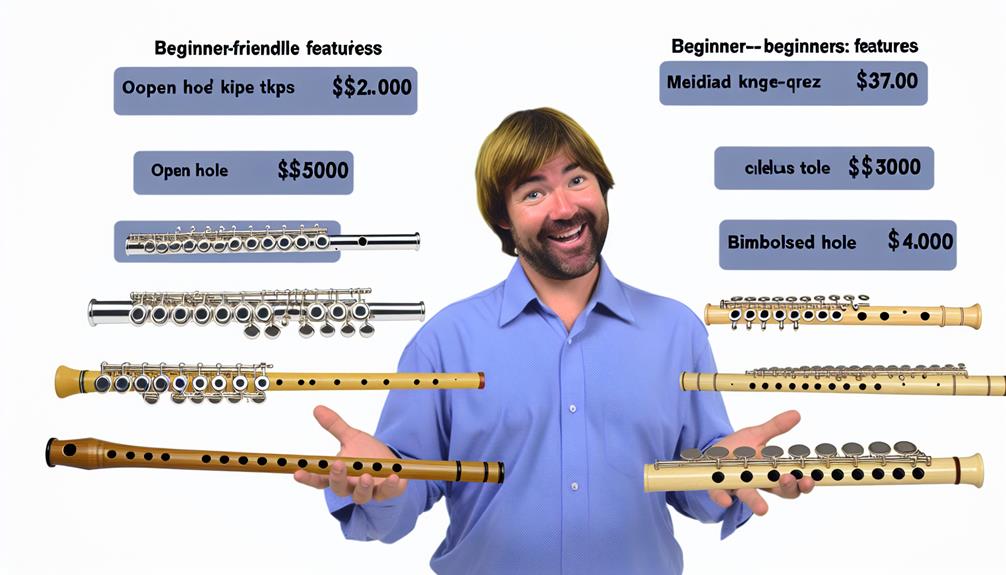When embarking on the journey of selecting a flute for beginners, one must carefully navigate through a myriad of options. The choice of flute is a crucial decision that can significantly impact a beginner's learning experience and musical journey.
Factors such as the type of flute, materials used in its construction, key mechanisms, and the budget set aside all play pivotal roles in this decision-making process. Understanding these aspects will not only assist in making an informed choice but also ensure that the chosen instrument aligns with the beginner's goals and aspirations in music.
Key Takeaways
- Consider budget, skill level, and personal preferences in selecting a flute.
- Choose a closed-hole flute with ergonomic features for beginner-friendly playing.
- Opt for nickel silver or plastic for affordability and durability.
- Prioritize key features like offset G keys and split E mechanism for ease of learning.
Types of Flutes Beginners Can Choose
When considering types of flutes beginners can choose, it is essential to understand the key differences between the most common options available in the market.
The two primary types of flutes suitable for beginners are the standard silver flute and the closed-hole flute. The standard silver flute, also known as the Western concert flute, is the most widely recognized and played flute worldwide. It is versatile, producing a bright and clear tone suitable for various music genres.
On the other hand, the closed-hole flute is often recommended for beginners as it helps develop proper finger placement and technique due to the holes being covered. This type of flute is ideal for beginners who are just starting their musical journey and seeking guidance in building a strong foundation.
Both types of flutes offer unique characteristics, and the choice between them ultimately depends on personal preferences and the goals each beginner hopes to achieve in their musical endeavors.
Factors to Consider When Selecting
In the process of choosing a flute for beginners, it is imperative to carefully consider several key factors that can significantly impact the player's learning experience and musical development. To make an informed decision, aspiring flutists should take into account the following factors:
| Factor | Description |
|---|---|
| Budget | Determine the amount you are willing to invest in a flute, considering both short-term affordability and long-term goals. |
| Skill Level | Choose a flute that matches your current skill level to ensure it is neither too basic nor too advanced for your abilities. |
| Ergonomics | Pay attention to the flute's key ergonomics, such as finger hole placement and key weight, to ensure comfort during practice sessions. |
Understanding Different Flute Materials
Exploring the various materials used in flute construction provides valuable insight into the instrument's tone, durability, and overall performance. Flutes are commonly made from materials such as silver, nickel silver, and various types of plastic.
Silver flutes are renowned for their rich and warm sound quality, making them a popular choice among professional musicians. Nickel silver, a durable alloy, is often used in student or beginner flutes due to its affordability and resilience to damage. Plastic flutes, on the other hand, are lightweight, easy to maintain, and suitable for young players or those on a budget.
Each material offers distinct characteristics that can affect the playability and tone of the instrument. Silver flutes, for example, produce a brighter and more resonant sound compared to nickel silver or plastic. Beginners should consider their budget, playing goals, and personal preferences when selecting a flute material, as each option brings unique qualities to the instrument.
Understanding the differences between these materials will help aspiring flutists make an informed decision when choosing their instrument.
Importance of Flute Key for Beginners
Understanding the significance of flute keys is crucial for beginners embarking on their musical journey. The key system of a flute affects how easily a player can produce different notes and the overall playability of the instrument.
As a beginner, here are some key points to consider:
- Closed Hole vs. Open Hole: Beginners often start with closed-hole flutes as they are easier to play. Open-hole flutes are more advanced and require more precise finger placement.
- Offset G vs. Inline G: Flutes with an offset G key are generally more comfortable for beginners as they align the G key with the left-hand finger, reducing strain.
- Split E Mechanism: Some flutes come with a split E mechanism that makes it easier to produce high E notes. This feature can be beneficial for beginners struggling with that particular note.
- C Foot vs. B Foot: Beginners usually start with a C foot flute due to its lighter weight and shorter length. A B foot flute allows for a lower range but may be more suitable as players advance in their skills.
Understanding these key aspects of flute design can help beginners make an informed decision when choosing their instrument.
Setting a Budget for Your Flute
When considering the purchase of a flute, establishing a budget is a fundamental step in the decision-making process for beginners. Setting a budget helps narrow down the options available, ensuring that you find a flute that not only suits your needs but also fits within your financial constraints. Beginners often look for affordable yet quality instruments to start their musical journey without breaking the bank.
It is essential to remember that the price of a flute can vary significantly based on factors such as the material, brand, and craftsmanship. By setting a budget from the outset, beginners can focus their search on flutes that fall within their price range, avoiding the temptation to overspend on features they may not yet need.
Additionally, having a budget in mind provides a sense of direction when exploring different flute options, preventing beginners from feeling overwhelmed by the wide range of choices available. Ultimately, setting a budget for your flute purchase allows you to make a more informed decision that aligns with both your musical aspirations and financial capabilities.
Frequently Asked Questions
Can a Beginner Start Learning on a Professional-Grade Flute, or Is It Better to Begin With a Student Model?
Starting on a professional-grade flute as a beginner can hinder progress due to its complexity and cost. Begin with a student model to build a strong foundation. Transitioning to a higher-level flute later will be more enjoyable and beneficial.
Are There Any Specific Flute Brands or Manufacturers That Are Recommended for Beginners?
When considering flute brands for beginners, reputable options such as Yamaha, Gemeinhardt, and Trevor James are often recommended. These manufacturers offer reliable student models with quality craftsmanship, making them ideal choices for those starting their musical journey.
How Often Should a Beginner Have Their Flute Serviced or Maintained?
Beginners should have their flute serviced or maintained at least once a year to ensure optimal performance. Regular maintenance can prevent issues and keep the instrument in good condition, allowing for a smooth learning experience.
Are There Any Specific Accessories or Additional Items That Beginners Should Consider Purchasing Along With Their Flute?
Consider purchasing essential accessories like a cleaning rod, cloth, and a sturdy case to protect your flute. Additionally, a metronome can aid in developing rhythmic skills, while a music stand enhances practice sessions.
Is There a Specific Age Range That Is Ideal for Starting to Learn the Flute as a Beginner?
The ideal age range for starting to learn the flute as a beginner is typically around 8-10 years old. At this age, children have developed enough lung capacity, hand-eye coordination, and cognitive abilities to begin learning this complex instrument effectively.
Conclusion
In conclusion, choosing a flute for beginners involves considering factors such as type, material, key, and budget.
Selecting the right flute is crucial for a successful start in learning to play this beautiful instrument.
Just as a delicate flower needs the right amount of sunlight to bloom, finding the perfect flute will help beginners flourish in their musical journey.

